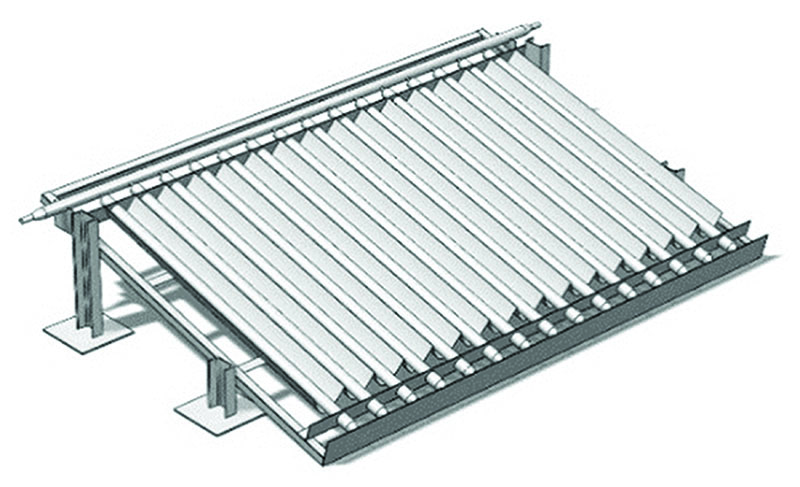การศึกษาความเป็นไปได้ในการลงทุนของตัวรับรังสีแสงอาทิตย์สำหรับ การอุ่นนํ้าป้อนในระบบหม้อไอนํ้าเชื้อเพลิงไม้
Main Article Content
บทคัดย่อ
บทความวิจัยนี้มีวัตถุประสงค์เพื่อศึกษาความเป็นไปได้ในการลงทุนของตัวรับรังสีแสงอาทิตย์สำหรับการอุ่นนํ้าป้อนในระบบหม้อไอนํ้าเชื้อเพลิงไม้เพื่อใช้ลดต้นทุนการใช้เชื้อเพลิงของโรงงานผลไม้กระป๋องอำเภอพนัสนิคม จังหวัดชลบุรี ซึ่งรูปแบบแผงรับความร้อนแสงอาทิตย์ที่ศึกษามีสองรูปแบบ ประกอบด้วย รูปแบบแผงรับความร้อนแบบท่อแก้วสุญญากาศรูปประกอบพาราโบลาและแบบแผ่นเรียบรูปประกอบพาราโบลา โดยวิเคราะห์ข้อมูลจากประสิทธิภาพเชิงความร้อน ต้นทุนแผงรับความร้อนแสงอาทิตย์และความคุ้มค่าทางเศรษฐศาสตร์ในการพิจารณาความเป็นไปได้ในการลงทุน จากผลการศึกษาพบว่าประสิทธิภาพเชิงความร้อนเฉลี่ยของแผงรับความร้อนแบบท่อแก้วสุญญากาศรูปประกอบพาราโบลาและแบบแผ่นเรียบรูปประกอบพาราโบลาเท่ากับ 60.6 % และ 58.1 % โดยผลต่างของอุณหภูมินํ้าป้อนของแผงรับความร้อนแสงอาทิตย์ระหว่างสองรูปแบบเท่ากับ 1.8 oC เมื่อพิจารณาความเป็นไปได้ในการลงทุนทั้งประสิทธิภาพเชิงความร้อนและต้นทุนของแผงรับความร้อนพบว่าต้นทุนแผงรับความร้อนแสงอาทิตย์แบบท่อแก้วสุญญากาศรูปประกอบพาราโบลามีต้นทุนสูงกว่าแบบแผ่นเรียบรูปประกอบพาราโบลาเท่ากับ 4,365 บาทต่อตารางเมตร แต่ทั้งสองรูปแบบสามารถผลิตนํ้าป้อนได้อุณหภูมิที่ใกล้เคียงกันดังนั้นรูปแบบแผงรับความร้อนแสงอาทิตย์แบบแผ่นเรียบรูปประกอบพาราโบลาจึงมีความเป็นไปได้ในการลงทุนของตัวรับรังสีแสงอาทิตย์สำหรับการอุ่นน้ำป้อนในระบบหม้อไอน้ำเชื้อเพลิงไม้ สามารถประหยัดค่าใช้จ่ายเชื้อเพลิงไม้เท่ากับ 45,639.70 บาทต่อปี เมื่อพื้นที่รับแสงของแผงรับความร้อนแสงอาทิตย์เท่ากับ 119.07 m2 และมูลค่าปัจจุบันสุทธิ (NPV) มีค่าเท่ากับ 10,887.80 บาท ซึ่งมีอัตราผลตอบแทนภายใน (IRR) เท่ากับ 0.32 % และระยะเวลาคืนทุน (Payback Period) เท่ากับ 14.83 ปี
Article Details
เอกสารอ้างอิง
[2] Celuppi, R., Scapinello, J., Andrade, F. G. D., Revello, J. H. P., and Magro, J. D. (2014). Solar Energy Use for Water Pre-Heating in Boilers of Agro-Industries. Journal of Engenharia Agricola. Vol. 34, No. 3, pp. 451-460. DOI: 10.1590/S0100-69162014000300009
[3] Rabl, A., O’Gallagher, J., and Winston, R. (1980). Design and Test of Non-Evacuated Solar Collectors with Compound Parabolic Concentrators. Solar Energy. Vol. 25, Issue 4, pp. 335-351. DOI: 10.1016/0038-092X(80)90346-1
[4] Chamsa-ard, W., Sukchai, S., Pongtornkulpanich, A., Sonsaree, S., and Laodee, P. (2012). Development of Compound Parabolic Concentrating Collector (CPC). Bangkok: Naresuan University
[5] Sonsaree, S., Chamsa-ard, W., Sukchai, S., Laodee, P., and Sirisamphanwong, C. (2014). Development of a Compound Parabolic Concentrating Solar Collector. Burapha Science Journal. Vol. 19, No. 2, pp. 105-121
[6] Quaak, P., Knoef, H., Stassen, H., Quaak, P., Knoef, H., and Stassen, H. (1999). Energy from Biomass: A Review of Combustion and Gasification Technologies (English). World Bank technical paper; no. WTP 422. Energy series. Washington, D.C.: The World Bank. https://documents.worldbank.org/curated/en/936651468740985551/Energy-from-biomass-a-review-of-combustionand-gasifi cation-technologies.
[7] John A. Duffie and William A. Beckman. (1974). Solar Energy Thermal Processes. New York: John Wiley & Sons.
[8] Kongcharoen, K. and Jitsanguan, T. (2006). Economic Analysis of Project Investment on Hot Water Production from Integrated Solar Energy System: Case Study of Klang Hospital, Rayong Province. Applied Economics Journal. Vol. 11, No. 1-2, pp. 33-48
[9] Awirothannaon, A. (2016). Financial Feasibility of the use of Mixing Valve Solar Hot Water by Industrial Enterprises in the Northern Region. In 12th Naresuan Research Conference. 21-22 July 2016. Phitsanulok, Thailand. pp. 1170-1179
[10] Malahom, T. (2007). A Study of the Performance of Heat Pipe Solar Collector for Hot Water System. Chulalongkorn University


